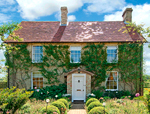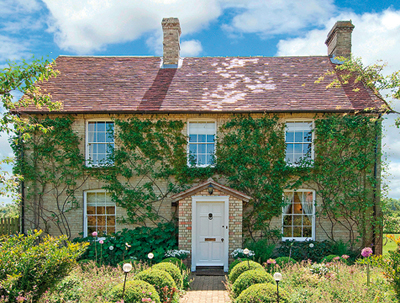The property market in Cambridge
Cambridge, recently listed as likely to survive economic turmoil, is still attracting huge demand for properties for sale at the top end of the market


The latest report from the influential Centre for Cities think tank lists Cambridge among the five UK cities best equipped to survive the economic turmoil-along with Aberdeen, Edinburgh, London and Milton Keynes. With its world-class university, dynamic private sector, highly skilled workforce, excellent choice of schools, ease of access to London and outstanding quality of life, Cambridge regularly tops the polls as one of the best places to live in rural Britain. Added to that, the Centre for Cities found that, of the 64 cities surveyed, Cambridge had the lowest rate of unemployment.
Not surprisingly, the city's prosperity is reflected in a vibrant and competitive property market, which has seen house prices increase by some 15% to 20% since 2007, compared with price falls of roughly similar proportions in the surrounding villages and countryside.
Cambridge's global reputation as a centre of enterprise and innovation in both the private and public sectors (Microsoft and Addenbrooke's Hospital rank high among the city's major employers) attracts a broad mix of high-flying entrepreneurs and academics from home and overseas, as well as professionals in fields such as accountancy, law and finance. Some stay for a few years before moving on, but many are seduced by the city's history and architecture, and become residents for life.
Anecdotal evidence from Cambridge estate agents illustrates not only the international character of the upper end of the housing market, but also the sustained competition between buyers in the favoured south side of the city, where good houses are always in short supply. ‘From an agent's point of view, what counts in the long-term is not so much what happens in a booming market, as what happens when the market is slow,' says Chris Carey of Bidwells, who finds the steady turnover of sales in the city reassuring.
Bidwells (01223 841842) recently agreed the sale of 46, St Barnabas Road, a refurbished and extended Victorian town house in central CB1, to a buyer from the Far East at ‘substantially more' than the £925,000 guide price, after 10 viewings and seven days on the market. Just before Christmas, a Cambridge-based family looking for a project agreed to pay close to the £1.5 million guide price for Grade II-listed Church Farm at Babraham, six miles from Cambridge and well placed both for Addenbrooke's Hospital and London, via nearby Whittlesford mainline station. Now, the firm is quoting a competitive £998,500 guide price for Howelands on Huntingdon Road, CB3, a six-bedroom 1920s house with lovely gardens in the west of the city, opposite the gates of Girton College.
At the back end of last year, James Barnett of Savills sold a three-storey, semi-detached, five-bedroom Victorian town house at 24, Lyndewode Road, CB1, close to Cambridge station and the city centre, for some 20% more than the £985,000 guide price. ‘It was a typical Cambridge town-house scenario, with 60 potential purchasers viewing the house over a period of two weeks, and a range of bidders producing six offers at more than the guide,' says Mr Barnett. The house was eventually sold to a former Cambridge alumnus currently based overseas, who is now preparing to return to England.
Although the property market in Cambridge city remains more or less insulated from the effects of the economic downturn, houses in the villages and countryside roundabout have seen values fall by 10%-15%, or more, since the start of the recession-which is clearly good news for affluent cash buyers looking to move out of Cambridge.
Exquisite houses, the beauty of Nature, and how to get the most from your life, straight to your inbox.
One of the most appealing country properties currently on the market within easy commuting distance of both Cambridge city centre and London is idyllic Rectory Farmhouse (pictured) at Orwell, six miles south-west of Cambridge. Carter Jonas (01223 368771) quote a guide price of £1.25m for a 99-year National Trust lease on the farmhouse, which sits quietly tucked away at the heart of the Trust-owned Wimpole estate, and comes with a range of outbuildings, enchanting gardens and a pony paddock-31⁄4 acres in all.

* Subscribe to Country Life and save up to 41%
The house had been empty for 40 years when its present owners, Paul and Maggie Pinnington, bought it in 1997. Now beautifully restored and extended, Rectory Farmhouse has three reception rooms, a kitchen/breakfast room, five bedrooms and four bathrooms. But its crowning glory is its delightful formal gardens, created from the bare, unfor-giving clay by Mrs Pennington and designer Peter Reynolds and dubbed ‘a model of [their] kind' by gardening writer Steven Desmond (Country Life, December 8, 2010).
But the first real health check for the Cambridgeshire country-house market comes with the launch, through Savills (020-7016 3780) of the 189-acre Horseheath Lodge estate at Linton, 14 miles south-east of Cambridge, at a guide price of £6.5m for the whole, or in eight lots. At its heart is a beautifully restored, Grade II-listed mansion house, built for racehorse trainer Stanlake Batson in 1815; originally three storeys high, it was reduced in size and ‘Georgianised' after the Second World War. In pristine condition throughout, it now has four main reception rooms, seven main bedrooms and four bathrooms; secondary accommodation includes a staff annexe, five self-contained cottages and a farmhouse.
It is rare indeed to find an estate of this size so close to Cambridge, even more so one that provides a substantial rental income from the letting of six estate houses, the stableyard and the grassland. The setting for the lodge is spectacular, with immaculate post-and-railed fencing lining the drive. The feeling of space and grandeur is accentuated by wide, formal lawns and commanding parkland views on all sides. To the north-east of the house lies a newly restored walled kitchen garden, in full productive mode. The walled garden is also home to an ornamental garden, recently planted with an array of shrubs and two formal lawns.
Country Life is unlike any other magazine: the only glossy weekly on the newsstand and the only magazine that has been guest-edited by His Majesty The King not once, but twice. It is a celebration of modern rural life and all its diverse joys and pleasures — that was first published in Queen Victoria's Diamond Jubilee year. Our eclectic mixture of witty and informative content — from the most up-to-date property news and commentary and a coveted glimpse inside some of the UK's best houses and gardens, to gardening, the arts and interior design, written by experts in their field — still cannot be found in print or online, anywhere else.

